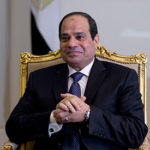- Stay Connected
Egypt’s Sisi: We do not support Ethiopian opposition, seek political solution in Syria

No explanation by the president why the Egypt media and the elite are behind the unrest .
Egypt’s President Abdel Fattah El-Sisi said on Thursday that Egypt has not plotted against Ethiopia or supported the Ethiopian opposition.
“Our choice is cooperation and peace,” El-Sisi said in a speech that covered several issues during a military lecture held by the Egyptian armed forces in Cairo on Thursday.
Earlier this week, Ethiopian officials accused Egypt and Eritrea directly of supporting anti-government demonstrations by the Oromo ethnic group.
The Egyptian ministry of foreign affairs denied the allegations entirely.
“I reaffirm to our brothers in Ethiopia that we had two choices, either cooperation or confrontation, and we chose cooperation,” El-Sisi said, adding that Egypt’s values do not allow supporting any party or opposition outside Egyptian territory.
Egypt and Ethiopia witnessed tensions in recent years over the construction of Ethiopia’s Grand Renaissance Dam, a project which Cairo fears will negatively affect Egypt’s Nile water share. Addis Ababa maintains that the dam project, which Ethiopia needs to generate electricity, would not harm downstream countries.
Relations improved in recent months, particularly after Egypt, Ethiopia and Sudan signed in September the final contracts for the long-awaited technical studies on the potential impact of the dam on downstream countries.
Shifting to Egypt’s policy towards Syria and the UN Security Council resolutions voted on earlier this week, the Egyptian President stated that Egyptian policy towards the conflict in Syria is independent.
“We looked to the French and Russian draft resolutions and voted on them because both draft resolutions called for a ceasefire and truce that will allow humanitarian aid to Syrian citizens,” he said
Reiterating the need for a political solution in Syria, El-Sisi demanded full respect for the Syrian people, the disarming of radical groups and the rebuilding of the Syrian state.
Egypt voted on Saturday for a French-drafted Saudi-backed resolution on Syria and also for a rival Russian proposal.
The French proposal called for an end to all fighting in Aleppo, while the Russian proposal called for a cease-fire. Both proposals failed to pass in the Security Council.
“Nobody can interfere in our strong relations with our brothers in the Gulf, but we have an independent policy that is keen on Arab national security,” Egypt’s president said.
The Saudi ambassador’s departure coincided with a notice from Saudi oil company ARAMCO informing the Egyptian General Petroleum Corporation, Egypt’s state oil company, in early October that it would halt the supply of refined oil products to Egypt.
“Some observers believed that the decision to suspend oil shipments from Saudi Arabia was because of the UN Security Council votes; it is untrue,” El-Sisi said.
“The oil shipments used to come to Egypt according to a deal that was signed in April; we do not know the circumstances of the companies,” he added.
Egypt’s oil ministry has contracted other foreign suppliers including Kuwait to provide the country with its petroleum needs for October.
“We do not have any oil problem,” El-Sisi said.
“There are attempts to pressure us, but Egypt does not bow except for God,” he said, but did not provide further detail on such attempts.
Source : Ahram online
